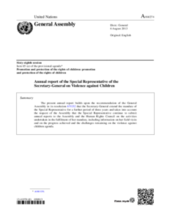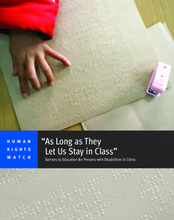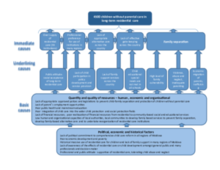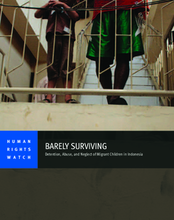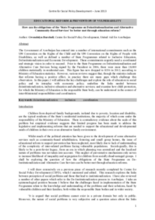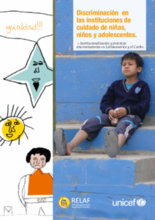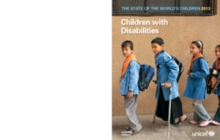Displaying 571 - 580 of 771
The objective of this study was to determine whether children's characteristics and/or institutional characteristics were predictors of severe punishments (including beatings) and/or frequency of punishments that children received from staff in Romanian institutions.
In her annual report to the UN General Assembly, the Special Representative of the Secretary-General highlights the results of an expert consultation on violence in early childhood. The consultation highlighted the urgency of supporting families and caregivers in their child-rearing responsibilities and securing a responsive national child protection system to strengthen families’ capacity to raise young children in safe environments and prevent child abandonment and placement in residential care.
Across China, children and young people with disabilities confront discrimination in schools.
This graphic provides a visual representation of the causal framework of children’s institutionalization in Moldova. It was developed as part of the USAID/DCOF-funded project “Protecting children in Moldova from family separation, violence, abuse, neglect and exploitation.”
This paper provides details of research into the gatekeeping system in Bulgaria for children under three and examples from recent Bulgarian and international practice. It suggests that gatekeeping could benefit from a social development orientation including activities to combat poverty and promote social inclusion through supporting community and family strengths.
This article describes the historical background and current situation of the child welfare system for children without parental care in Poland.
While many migrants and asylum-seeking children may try to reach Australia, they often spend months or years caught in Indonesia.
This paper presents an examination of the linkages between education and the deinstitutionalization of children in Azerbaijan. The paper explores the role of education in social policy and its interplay with economic policy; underlines the links needed between deinstitutionalization, inclusive education and alternative services; and examines how child protection can be understood in the context of inter-Ministerial responsibilities and coordination.
El presente informe refleja distintos aspectos del fenómeno de discriminación que sufren las niñas, niños y adolescentes sin cuidado parental que residen en instituciones de América Latina y el Caribe.
In its 2013 State of the World’s Children Report, UNICEF has chosen to highlight the particular issues, needs, and circumstances of children with disabilities worldwide. The report includes a description of the common issues that children with disabilities face, models for inclusive policy and practice, and an agenda for action moving forward.

